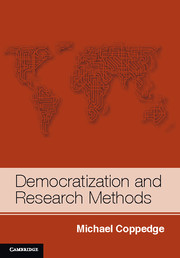Book contents
- Frontmatter
- Contents
- List of tables
- List of figures
- Acknowledgments
- 1 Research methods and democratization
- 2 Defining and measuring democracy
- 3 Criteria for evaluating causal theories
- 4 Checklists, frameworks, and Boolean analysis
- 5 Case studies and comparative history
- 6 Formal models and theories
- 7 Rigor in extensive and intensive testing
- 8 Political culture and survey research
- 9 Quantitative testing
- 10 An agenda for future research
- References
- Index
5 - Case studies and comparative history
Published online by Cambridge University Press: 05 July 2012
- Frontmatter
- Contents
- List of tables
- List of figures
- Acknowledgments
- 1 Research methods and democratization
- 2 Defining and measuring democracy
- 3 Criteria for evaluating causal theories
- 4 Checklists, frameworks, and Boolean analysis
- 5 Case studies and comparative history
- 6 Formal models and theories
- 7 Rigor in extensive and intensive testing
- 8 Political culture and survey research
- 9 Quantitative testing
- 10 An agenda for future research
- References
- Index
Summary
None of the inventories of the causes of democracy surveyed in Chapter 4 can be taken at face value because they summarize conclusions from disparate and poorly integrated sources of uneven rigor. Before giving credence to checklist items, it is essential to find out from where they came. The remainder of this book therefore evaluates the strengths and weaknesses of the methods and approaches employed by the scholars who have launched these propositions into our collective academic mind.
If there were a way to measure quantities of information, there would be no doubt that the bulk of our knowledge of democratization comes from histories and case studies. It is ironic that noncomparative research so dominates a field known as comparative politics, but this is an irony that is long-standing and well known. The huge number of books and articles about the birth, death, or survival of democracy in dozens of countries in the twentieth century alone is more than any one scholar can digest. In fact, anyone unlucky enough to be buried under this small mountain of printed matter would surely be suffocated and crushed. To be sure, this literature does not satisfy all of the criteria for good theory. I argue in this chapter that histories and case studies produce a kind of knowledge that is unsurpassed in its thickness yet lacking in generality and theoretical integration. In this chapter, I also survey and critique a smaller but still sizable body of literature that consists of comparative histories: detailed comparisons of the historical development of a (usually) small number of cases. Comparative history has enough characteristics in common with case studies and histories to warrant discussing them jointly. Comparative history is a methodological compromise that preserves some thickness while reaching out toward generality and theoretical integration. Those who value thickness would be better off with histories and case studies, those who value generality would be better off with large-sample approaches, and those who value theoretical integration would better focus their efforts on deductive theorizing. Comparative history combines the weaknesses of case studies and quantitative methods when it comes to testing the general truth of a theory. Nevertheless, it has some advantages when the goal is theory development.
- Type
- Chapter
- Information
- Democratization and Research Methods , pp. 115 - 157Publisher: Cambridge University PressPrint publication year: 2012

